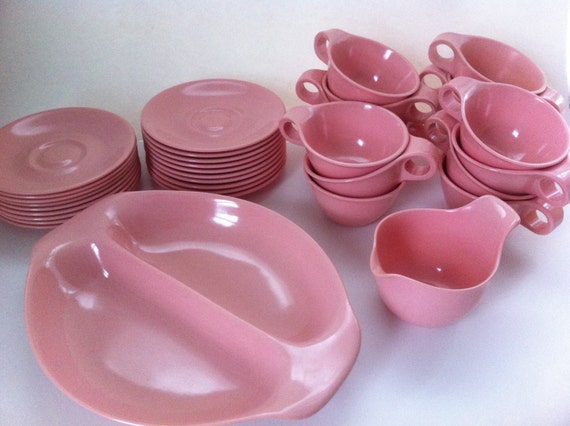I've seen some oddities along the way in my Russel Wright collecting and research. The two tone sets have to be the strangest and the most exciting. Needless to say, they do exist, and are quite rate. What they are is actually different than anything I've seen. There are blues/whites, yellow/whites, and pinks/whites that I've seen. All are marked
Residential.
The issue here is that some pieces are solid, but the plates, saucers, and platters actually have one color molded on the bottom, and another color molded onto the top. You have to do a double take to look very closely to make sure this is not a factory mishap. Looking on the edge you will see that indeed, care was taken to form a color on top, and color on the bottom! More proof that Wright, if experimenting with this sort of theme, was ahead of his time !
 |
| Two colors, chalk on top blue on base. Amazing! |
Of course the colors I have found haven't really matched that of the existing
Residential or
Home Decorator lines, so they must have been their own creation. There are some solid blue and pink pieces that are a hue off of the Home Decorators colors that these DO match, however oddly those blues and pinks were produced in solids also. So I assume, you could get your blue straight up, or on the rocks, with the chalky impact above. Honestly, I am unsure if they were a test run of created as a special order for someone. Examples I own look mint and first runs, no imperfections which mean the factory must have perfected this process.
There is no proof in Syracuse that Wright was experimenting with such colors, nor that such colors were approved at Northern Industrial Chemical Company, who molded this line for him. There is evidence however, of Wright's ongoing experimentation with the plastics in general. Early examples housed there show him putting metallic pieces into the melmac, experimentating with mottled colors , and actually baking melmac (probably in his own oven) and putting notes on the plates to see at what temperature they would burn or melt. Given that, I think Wright was experimenting with the two tone, but perhaps such a pain for the factory to make, that he didn't put it into mass production. In 20 years of collecting, I've only acquired a handful of examples.




